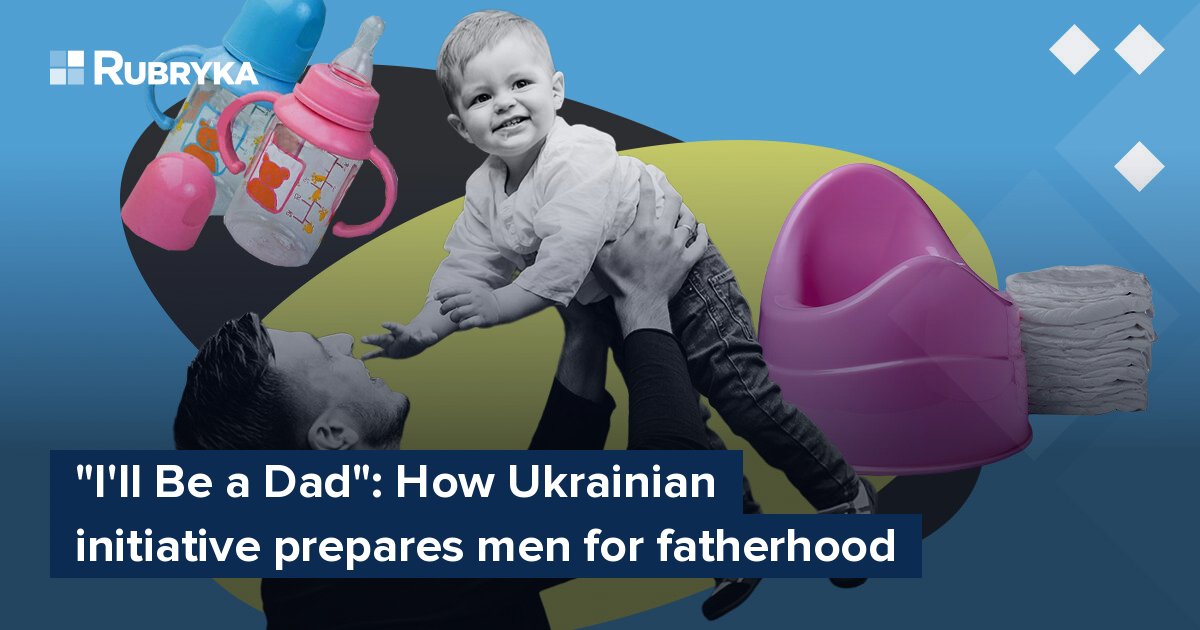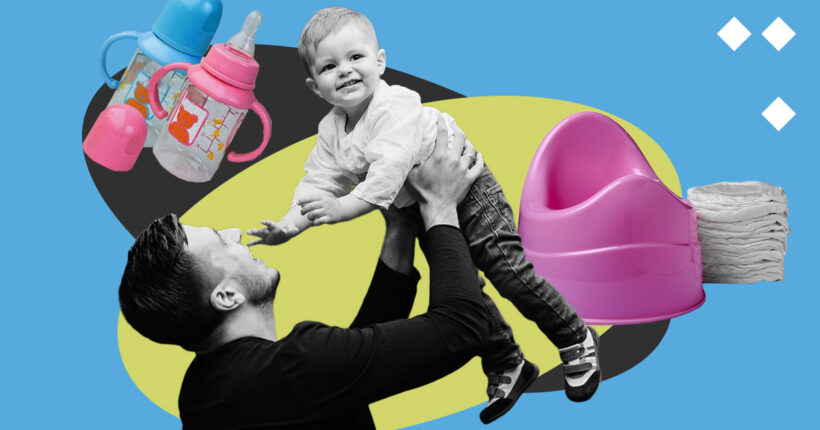
What's the problem?
Mothers are still expected to be fully responsible for raising their children, while fathers are expected to be absent. Fortunately, society's attitudes slowly change, and future fathers start learning more about childcare.
Often, men don't fully understand what a pregnant woman goes through. They don't know what kind of support she needs, how she changes, and how she should recover after giving birth. And, of course, what to do with a newborn?
What's the solution?
Ukraine's northwestern city of Rivne recently welcomed free lessons for future dads. The "I'll Be a Dad" course, started by obstetrician-gynecologist Artur Fedorkiv, is held monthly. In informal talks with men, the doctor discusses preparing for fatherhood, partner-assisted childbirth, the father's role in the process, and how to help the mother after birth, among many other topics.
How does it work?
"Tell this to my husband"
Artur Fedorkiv is an obstetrician-gynecologist with many years of experience. The "I'll Be a Dad" course is his personal idea, supported by the Rivne Regional Perinatal Center, where he has worked for 12 years.
Fedorkiv explains that "I'll Be a Dad" is a project that has been "gestating" and partially implemented over the last eight years. The idea came to life in August 2023. It all started with lectures for future moms. The obstetrician-gynecologist explained the most complex processes in a pregnant woman's body and talked about childbirth and the first moments of a baby's life.
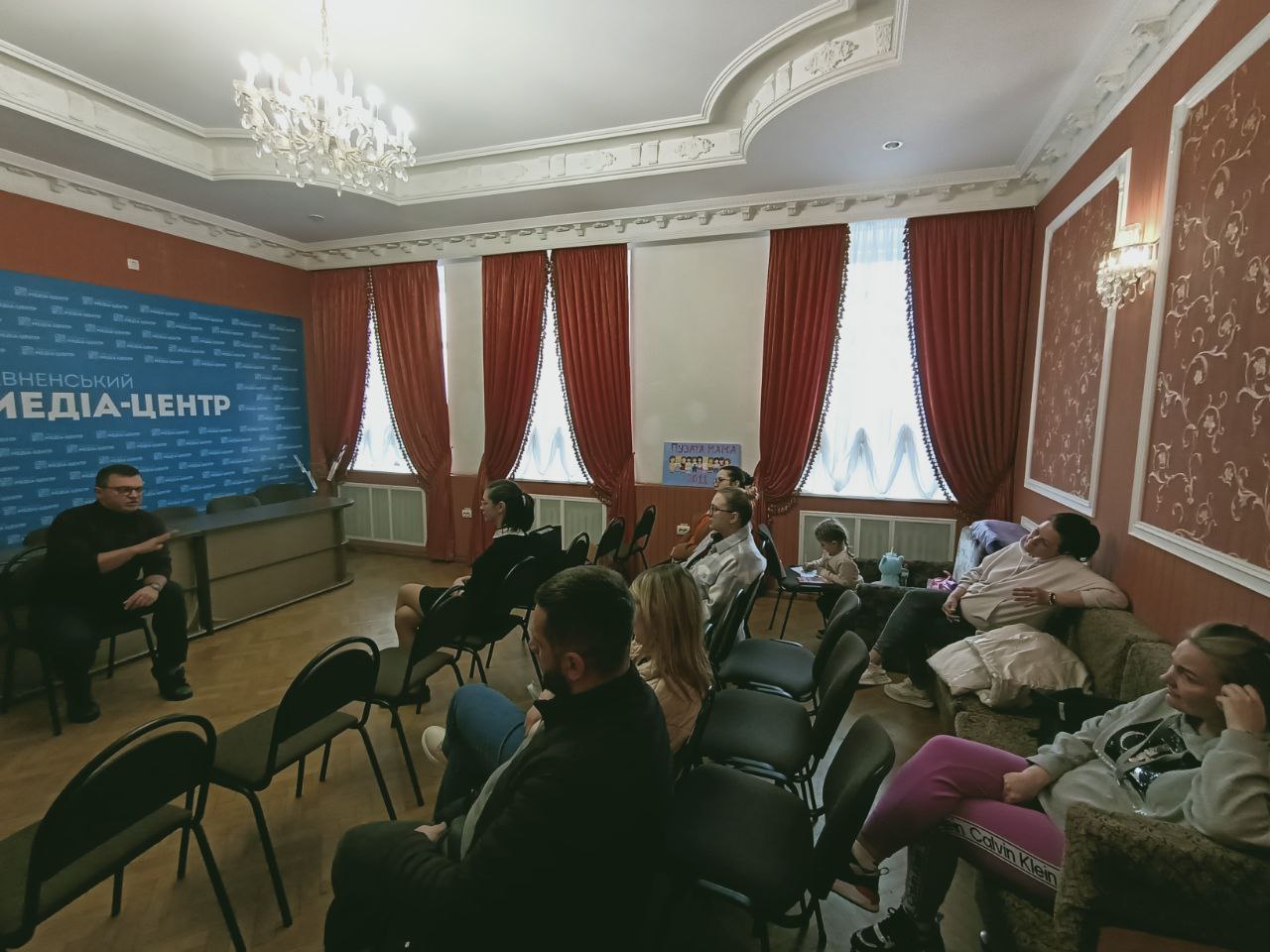
Artur Fedorkiv at a lecture for future parents, "Pregnant Mom." Photo from open sources
Pregnant women inspired Artur Fedorkiv to create a course specifically for men.
"At the lectures, I often heard women say, 'Tell this to my husband,' 'If only he understood this,' 'How can I explain this to him?' Women face the problem that men don't understand them, don't want or are afraid to take part in caring for the child, and don't know how to spend time with the baby," says Artur Fedorkiv.
The course author says the group talked about the high number of divorces in the first years of life together after the birth of a child and about the underestimation of the father's role in interacting with the child from the first days of life.
"For some reason, there is a belief that only the mother is responsible for the child while it is young, and fathers plan to get involved when the child goes to school. But the time to build relationships, shape character, and develop skills has passed. This isn't true for everyone, but many families still follow this pattern."
The doctor notes that during the war, these issues have become even more pressing, as many men are now defending Ukraine on the front line since Russia started its full-scale war and cannot always be with their children. Those who have this opportunity don't often appreciate it.
"That's why I wanted to create a course specifically for dads — to give them the knowledge and understanding of everything happening with their pregnant wife, how to support her, and how to prevent unnecessary misunderstandings and problems. So that men aren't afraid of fatherhood, know how to support their partner before, during, and after the birth of the baby, and ultimately become the best dads in the world," the doctor says.
Men's talks about preparing for fatherhood
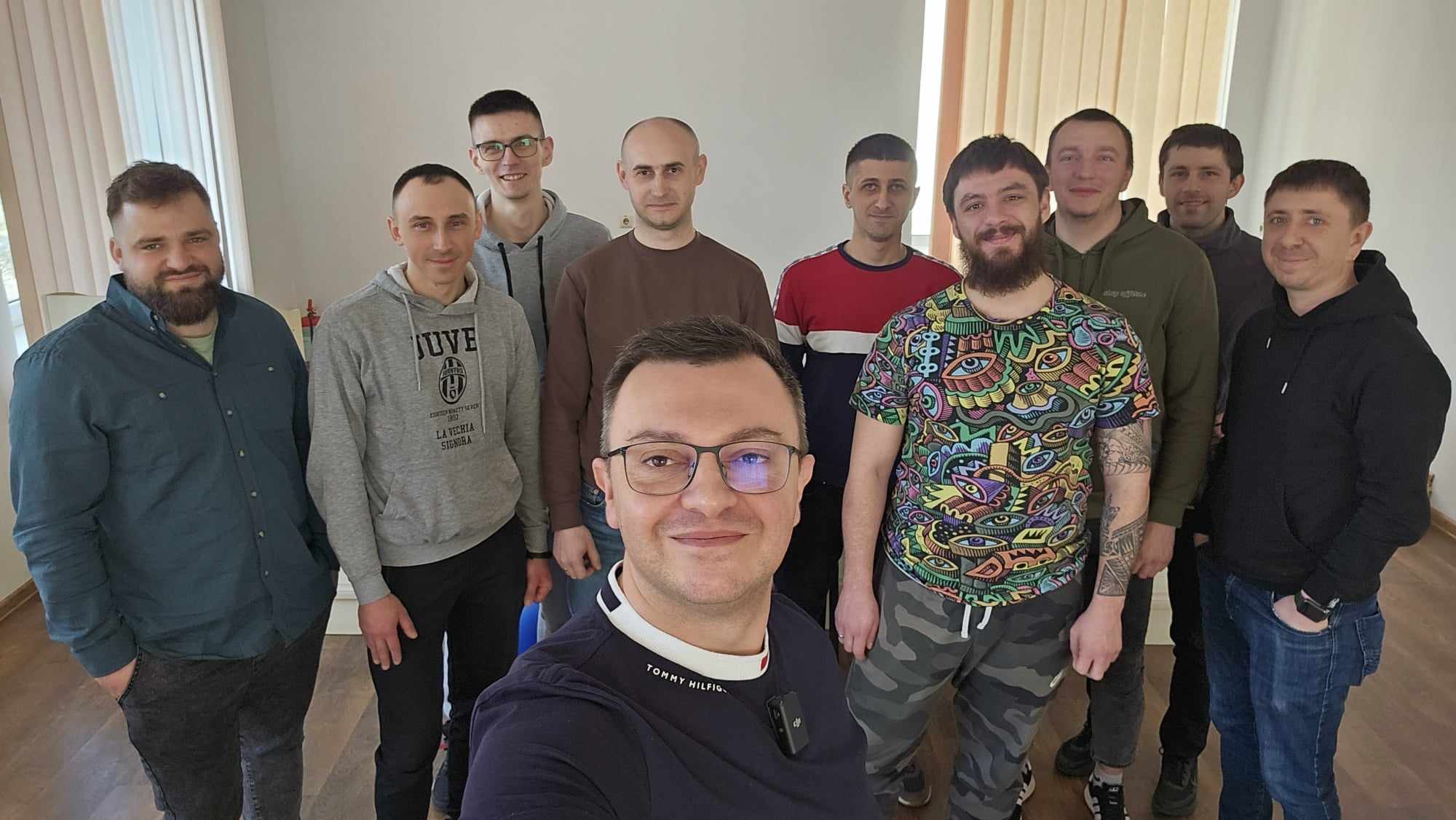
Artur Fedorkiv at a meeting with future dads. Photo from Artur Fedoriv's archive
Men think fatherhood starts after the baby is born, but that's not true. Research shows that the father's health and behavior affect the child before conception.
The role of a man in pregnancy and childbirth is truly important. Scientists confirm that men's involvement and support before the baby is born positively affect all family members. Moreover, men who helped before childbirth are likely to continue helping afterward. This benefits the children, resulting in better academic performance and social development.
For example, in Scandinavian countries, known for their high happiness levels, 80% of surveyed fathers attended parenting preparation courses. Artur Fedorkiv's courses aim to make such practices common in Ukraine, too.
"I'll Be a Dad" provides future dads with new knowledge and skills. As Artur Fedoriv says, it's not a lecture or boring repetition of outdated principles. It's an open, honest conversation between real men with their own needs, fears, and lack of knowledge — a lively discussion and expert answers to the most uncomfortable questions.
"Few people talk to men about fatherhood in general, and at general courses for both partners, it's mostly women who talk and ask questions. At the 'I'll Be a Dad' course, we discuss everything that might interest men. The list of topics is huge. Often, we talk for 3-4 hours," says Artur Fedorkiv.
During the course, the doctor explains the changes happening to a pregnant woman and her emerging needs, how to prepare for childbirth, and what a man should know and do. He also teaches men about partner-assisted childbirth, which is not just a trend but also the most intimate and culminating moment in a couple's relationship, after which love becomes even stronger.
After discussing the postpartum period and the basics of parenthood, the group examines the father's involvement in childcare and upbringing. Artur Fedorkiv also dispels myths and superstitions associated with these crucial stages in life. All this is done in one session. Then, the doctor consults men in a Telegram chat created for communication with future and young parents.
The course founder adds that discussions during the course are very private, so there are almost no photos from the meetings.
"We don't invite anyone with cameras. We practice, but it's relative: we don't rub each other's backs to ease discomfort," the doctor laughs. "I show certain moments, but it's more about conversation."
The questions men ask are actually countless, including those they aren't accustomed to voicing aloud and don't always anticipate during pregnancy.
"We discuss the topic of sex, too, as it's an important component for many good relationships, both during pregnancy and after childbirth," obstetrician-gynecologist Fedorkiv explains. The course founder says he answers many questions: What do we do, how do we help during labor, and how do we not "break" the baby when dressing them? How do you help when the baby is choking?
"Why doesn't the husband, tired from work, come to a clean apartment after going out with the baby? Doesn't she love him anymore because there's no more sex or the attitude that was there before? And much more. I provide an understanding of all processes, and with understanding, solving problems becomes much easier," Fedorkiv says.
To convey important information to men in informal conversations, Artur Fedoriv draws on his 15 years in obstetrics, training, books, and his own experience of happy parenthood—raising a child from his wife's first marriage and their shared child—and his knowledge of how to love them equally.
"I was lucky to have a real man as an example. Such men were rare. Though not my blood relative, my grandfather knew how to love sincerely and unconditionally. He knew everything, understood, heard, supported, inspired, helped, and set the best example. Until his last breath, he remained a man for whom nothing was impossible," Mr. Artur shares.
Does it really work?
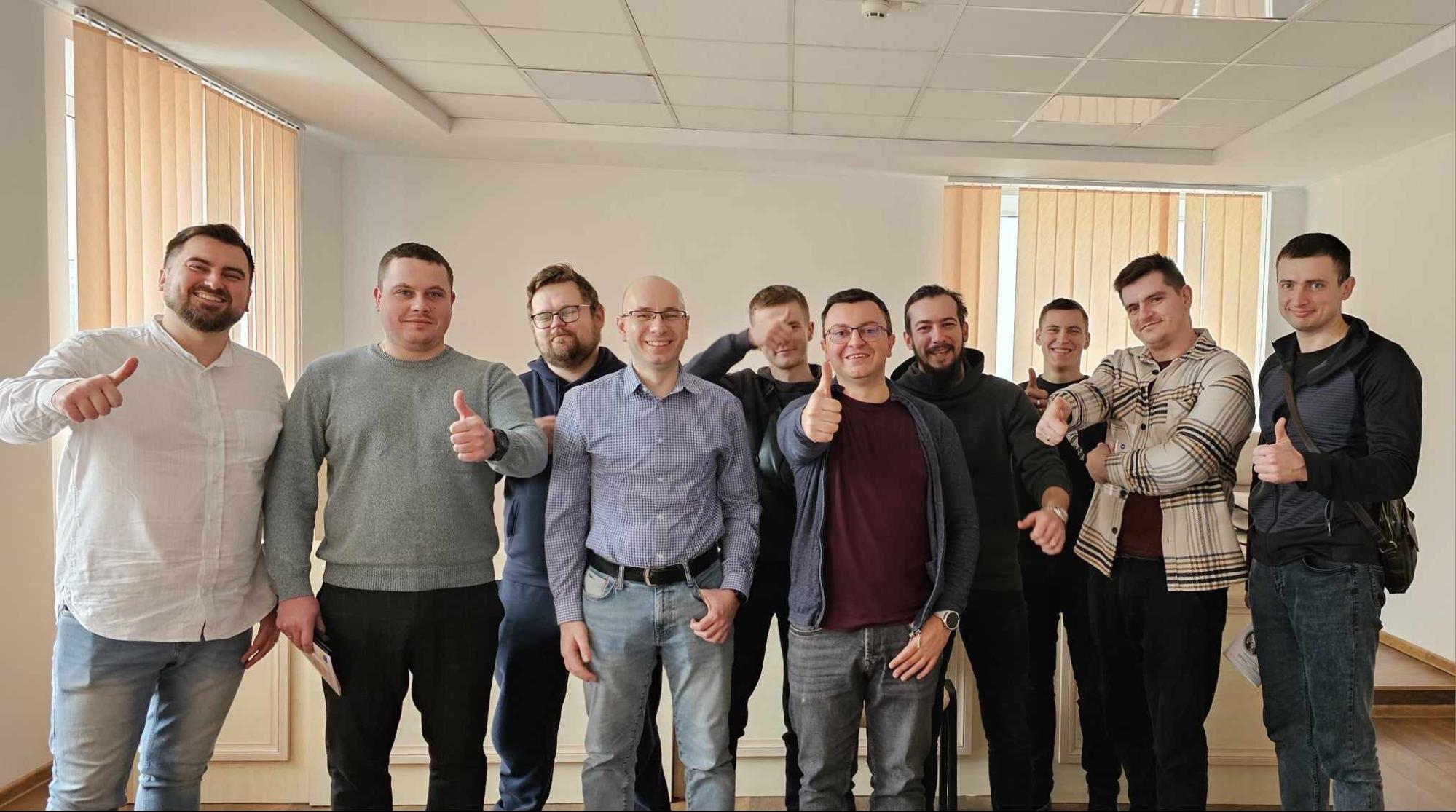
After the "I'll Be a Dad" course. Photo from Artur Fedorkiv's archive.
Psychologists say it's normal to be afraid of parenthood. Children inevitably change a couple's life. They demand attention, require habits and a daily routine, and require reconsidering the family budget.
"Everyone includes something personal in the concept of parenthood. For some, it's enough to provide for the family financially, while others are ready to change jobs to spend more time with the child," says Artur Fedorkiv. "An ideal father is, first of all, a caring, loving husband who has found and realized himself at work and in the family. Someone who finds time for hugs, conversation, walks, and shared hobbies. Someone who values the moment together and is happy in it."
Over a hundred dads have attended the "I'll Be a Dad" course since August of last year, and the feedback has been only positive.
"It's especially nice to hear words of gratitude from their wives, doctor colleagues with whom the dads shared their impressions, and those who helped such couples deliver their babies," says Artur Fedorkiv. "We maintain communication with the dads; they can always turn to us for advice, support, contacts of specialized professionals, interesting and useful books, and anything else."
For those who can't attend the "I'll Be a Dad" course, Artur Fedorkiv is preparing an online project with the same name. Every future dad will have the opportunity to prepare for the birth of their child, become an ideal partner in the delivery room for their wife, and a superhero for their child.
"After all, superheroes do exist, don't they?" says Artur Fedorkiv.


